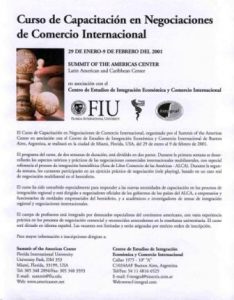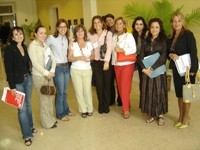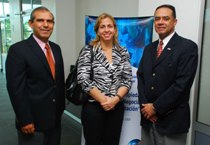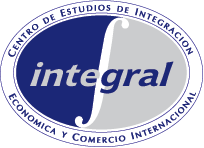KNOWLEDGE AS A PATHWAY TO PROGRESS
Integral has a vast and important record in government officials and business and civil society representatives training in international trade negotiations, trade agreements implementation and trade policy formulation. Since 2000, Integral has delivered training programs using case studies and role-playing simulation exercises to 1066 people of 19 Hemisphere countries. Those activities are summarized below.
I INTERNATIONAL TRADE NEGOTIATION SKILLS COURSE
The first International Trade Negotiation Skills Course took place from January 29- February 9, 2001 in Miami, Florida. The Summit of the Americas Center of Florida International University of the Latin American and Caribbean Center at the Florida International University (FIU) and the Centro de Estudios de Integración Económica y Comercio Internacional (Integral) of Buenos Aires, Argentina brought together government, private sector and non-governmental organizations from all over the region for what proved to be a very successful and fulfilling two weeks for all.
Twenty-seven participants from nine countries, including Argentina, Brazil, Costa Rica, Dominican Republic, Ecuador, Guatemala, Panama, Paraguay, and Uruguay, attended this intensive two-week course, which combined current information on hemispheric negotiations with practical skills training, and was taught entirely in Spanish.

II INTERNATIONAL TRADE NEGOTIATION SKILLS COURSE
The second International Trade Negotiation Skills Course was held in Miami, Florida, from 14 to 26 October 2001. This second edition of the course, jointly organized by the Summit of the Americas Center at the Latin American and Caribbean Center at the Florida International University and the Center of Studies on Economic Integration and International Trade (INTEGRAL), succeeded in gathering government officers and private sector representatives from the hemisphere to a fruitful training experience in international trade negotiations, from a theoretical as well as practical perspective.
INTERNATIONAL TRADE NEGOTIATIONS – BOLIVIA TRADE AND BUSINESS COMPETITIVENESS (BTBC)
The Intensive Course on International Trade Negotiations Skills was held at the Hotel Hacienda Kaluyo, in Cochabamba, Bolivia, from March 30th to April 2004, and included 32 participants, 21 from the public sector (primarily from the Ministry of Foreign Relations, but also from Economic Development, Agriculture, and Customs) and 11 from private business and export organizations and other technical entities.
The course, one of the Bolivia Trade and Business Competitiveness (BTBC) activities – founded by USAID and implemented by Chemonics International Inc. -, was inaugurated with opening remarks by Carl A. Cira, director of FIU’s Summit of the Americas Center and Walter Nuñez, Chemonics BTBC Trade and Investment Area Manager.
The course provided 70 hours of formal instruction, negotiation practice, and document preparation over an eight-day period. It consisted of 25 class hours of preliminary briefings, lectures and instruction, 39 hours of simulated negotiations, and 6 hours of document and support material compilation and preparation. A preliminary negotiation practice exercise was performed, based on the November 2003 Miami Trade Ministerial Declaration. The Study Case for the negotiation simulation exercise, core of the trade negotiation training, was based on actual 1993-95 negotiations among Brazil, Argentina, Paraguay and Uruguay, on the harmonization of MERCOSUR technical barriers to trade in the pharmaceutical sector. The course developed well and was very well received. The participants responded seriously and professionally to course methodology and content throughout the week and they expressed high levels of satisfaction at the final debriefing.
In his final remarks at the closing of the course, Walter Nuñez, who had been present and participated in the entire course, observed and acted as a facilitator for the simulated negotiating sessions, and had been present in the prior two daily FIU instructor evaluations of the group’s daily performance, expressed his satisfaction with the course and expressed praise for the course to instructors on behalf of USAID and Chemonics.
Presentations by the instructors may be requested by email to our Projects Department. Additional information can be found at the following links:
X INTERNATIONAL TRADE NEGOTIATION SKILLS COURSE – INTELLECTUAL PROPERTY RIGHTS: FROM NEGOTIATION TO IMPLEMENTATION
The X Training Course in International Trade Negotiations – Intellectual Property Rights: From Negotiation to Implementation, organized by the Summit of the Americas Center of the Latin American and Caribbean Center at Florida International University and the Center of Studies on Economic Integration and International Trade, INTEGRAL, under the auspices of the Florida International University Faculty of Law, Merck, Sharp & Dohme and Squire Sanders & Dempsey LLP, was held in the premises of the Florida International University Faculty of Law in Miami, USA, from 14 to 23 March 2007.
The course, part of the training program in the areas of International Trade and International Trade Negotiations successfully developed since 2001, was given in Spanish, and was attended by 23 participants belonging to government and private sectors of countries of the hemisphere.

Intellectual Property Rights (IPR) protection is a topic not only important but also one of the most critical and controversial on the agenda of trade policy and international negotiations. Since the enactment of the TRIPS Agreement as part of the birth of the World Trade Organization (WTO) in 1995 and through the many regional, plurilateral or bilateral negotiations between member countries, there have been many debates and disputes arising regarding the scope, implementation and enforcement of the trade agreement commitments made in this area. Given the legal implications of IPR protection, as well as the social sensitivity that calls its interface with public health, technology transfer, development and poverty, the issue is the setting for a permanent confrontation of economic and commercial interests and political and ideological currents.
In this context, the course program treated the most contentious issues from two perspectives: the conceptual analysis of IPRs in the context of trade agreements, its meaning and scope, and the trade agreements commitments implementation, through a simulation exercise of a WTO Dispute Settlement Panel for an alleged breach of certain clauses of the TRIPS Agreement.
The combination of high level technical lectures on each of the topics of the program, the constant interaction between participants and instructors and a special review session that took place before the exercise, together with the simulation exercise development – in which participants respectively played the roles of plaintiff, defendant and third parties government delegations official representatives, resulted in a highly innovative and enriching learning experience, as reaffirmed by all participants evaluations at the end of the activity.
The X Course was taken by 23 people coming from Argentina (3), Brasil (1), Colombia (3), Costa Rica (1), Chile (1), El Salvador (3), USA (2), Mexico (1), Nicaragua (1), Paraguay (2), Uruguay (2) and Dominican Republic (3). Ten participantes came from the public sector and nine from the private sector – chambers of commerce and law offices, and four from the academia. All of them had direct relation with the intellectual property areas and some also with that of international negotiations, whether in their activities or, as was the case of the government officers, due to their roles within their institutions (intellectual property institutes, trade agreements implementation areas).
Consultants lectures may be requested by email to the Projects Departament.
- Course Report
- Lecturers and Instructors Resumes
- Participants List
- Participants Evaluation
- Photo Gallery
INTELLECTUAL PROPERTY RIGHTS – ONAPI – DOMINICAN REPUBLIC
The Trade Negotiations Training Workshop on Intellectual Property Rights took place in Santo Domingo – Dominican Republic, on February 9 to 14, 2009, within the USAID Program for Strengthening Institutional Capacity for DR-CAFTA Implementation, for officials of the National Industrial Property Office and other national institutions.
The workshop’s overall objective was to strengthen the capacities of the officials directly or indirectly related to the DR-CAFTA commitments implementation, in international trade negotiations and in instances related to the implementation of commitments concerning Intellectual Property Rights protection. As specific objectives, the workshop intended to teach to identify, analyze and understand the main concepts related to Intellectual Property Rights protection and its implementation in the framework of the international trade agreements, with particular attention to the commitments made in the DR-CAFTA and the TRIPS Agreement, the assessment of the impact of IPRs in the formulation of national trade policies and its projection on trade and investment, and to interpret and understand the scope of the commitments implementation and its projection on a potential trade dispute. The workshop combined conceptual presentations and implementation of theoretical knowledge by a simulated Dispute Settlement Panel on Intellectual Property Rights under the Dispute Settlement System of the World Trade Organization (WTO) Agreement on Certain Measures Concerning Patents and Test Data Protection.

The workshop was designed by Liliana Otero, INTEGRAL’s Training Programs Coordinator and Elena Di Vico, President of the Honorary Advisory Board of the institution and taught by INTEGRAL’s Associate Consultants Liliana Otero, Elena Di Vico and Norma Felix. The seminar involved 30 officials from the public sector and 6 representatives of the private sector.
Consultants lectures may be requested by mail to the Projects Department.
BASIC COURSE ON NEGOTIATION TECHNIQUES – ISPRI – DOMINICAN REPUBLIC
The Basic Course on Negotiation Techniques was held in Juan Dolio – Dominican Republic, from 11 to 16 May 2009, under the Institutional Support Programme for Regional Integration (ISPRI), for officials of member institutions of the National Trade Negotiations Commission and representatives of business associations that are part of the Commission. The group of participants consisted of 45 people, 38 of which belong to government agencies and 7 private sector entities.
The course aimed to teach the basics notions on international trade negotiations and conducted formal training on negotiation and bargaining practice over a period of six days. At the level of theoretical training, the program consisted of conceptual presentations concerning multilateral negotiations processes, techniques, tactics and strategies applied to the negotiations, communication and dissemination techniques, technical barriers and obstacles to trade and implications on market access. Bridging theory to practice, a negotiation simulation exercise on the harmonization of technical barrier in an imperfect customs union formed by four countries was performed.
The course was designed by Liliana Otero, Integral’s Program Training Coordinator and was dictated by Integral’s Associate Consultants, Elena Di Vico, Chairman of the Honorary Advisory Board of the institution, Nancy Celi Icaza and Liliana Otero, together with Jesus Bores Lazo, Bores & Cia.Lawyers of Barcelona, Spain.
Presentations by the consultants may be requested by email to our Projects Department. Additional information can be found at the following links:
ADVANCED COURSE ON NEGOTIATION TECHNIQUES – ISPRI – DOMINICAN REPUBLIC
The Advanced Course on Negotiation Techniques was held in La Romana – Dominican Republic, from 19 to 25 July 2009, within the framework of the Institutional Support Program for Regional Integration (ISPRI), for officials of public institutions and representatives of business associations members of the National Trade Negotiations Commission, as part of the training program organized by the ISPRI Program.
The course aimed to impart knowledge and skills on the preparation for bilateral trade negotiations. Formal instruction was provided in the main items on the trade negotiations agenda, including market access, government procurement, intellectual property rights, dispute resolution and labor, environmental, legal and institutional issues, oriented towards acquiring the necessary knowledge for an adequate preparation of an international trade negotiations, particularly issues regarding survey information and its analysis, identification of offensive and defensive interests, the elements to consider for developing sectoral positions and the roles pertaining to the public and the private sector. Considerations to be taken into account for further consensus building in order to reach a national negotiating position that represents the defense of the country’s interests where also made, taking into account the current and potential export supply, the sensitive products to the Dominican Republic and to its counterpart and the commercial commitments taken with third countries or blocs by both parts.
The theoretical concepts given were put in practice on a simulated negotiation for the preparation of the national negotiating position to defend market access issues on selected products, in the context of negotiating a bilateral free trade agreement between a small economy and a developed economy. For such negotiation participants were required to develop and negotiate the negotiating positions in market access of all represented parties for three different sectors: agriculture, agribusiness and industrial, on selected products.
The course was designed by Liliana Otero, Coordinator of Training Programs INTEGRAL and Elena Di Vico, President of the Honorary Advisory Board of the institution and taught by INTEGRAL Associate Consultants, Liliana Otero, Elena Di Vico and Nancy Cely Icaza, together with Jesus Bores Lazo, Bores y Cia Abogados, Barcelona, Spain. The seminar involved 39 officials from the public sector and six private sector representatives, most of whom had participated in the Negotiation Basic Course, taught by the same instructors team in May 2009.
Presentations by the consultants may be requested by email to our Projects Department. Additional information can be found at the following links:
SEMINAR ON INTELLECTUAL PROPERTY RIGHTS – ISPRI – DOMINICAN REPUBLIC
From 7 to 11 June 2010, was held in Santo Domingo, the Seminar on Intellectual Property Rights , within the framework of the Institutional Support Program for Regional Integration (ISPRI), for officials of public institutions and representatives of business associations members of the National Trade Negotiations Commission, as part of the training program organized by the ISPRI Program.
The content of the seminar covered the most important issues related to the protection of intellectual property rights as determined in the TRIPS Agreement and the sensitive issues source of conflict between member countries as well as on the new issues still under negotiation in the TRIPS Council, including the protection of traditional knowledge and folklore. The lectures also covered the aspect of intellectual property rights and their relationship to public health as determined by the Doha Declaration and related documents issued by the World Health Organization. The academic presentations were supplemented by a simulation exercise based on a dispute resolution over intellectual property rights, with regard to the implementation by a country of its obligations under the Agreement on Trade-Related Aspects of Intellectual Property Rights with (TRIPS).
The course was designed by Liliana Otero, INTEGRAL Training Program Coordinator, and dictated by INTEGRAL Consulting Associates Liliana Otero and Norma Felix, jointly with Josefina Aquino, former Counselor at the Permanent Mission of Dominican Republic in Geneva, Switzerland and representative of that country to the World Intellectual Property Organization (WIPO). The seminar involved 38 officers from the public and 4 private sector, some of whom had participated in the Basic and Advanced Negotiation Courses, held previously within the ISPRI Program framework for strengthening the National Trade Negotiations Commission.
Presentations by the consultants may be requested by email to our Projects Department. Additional information can be found at the following links:
